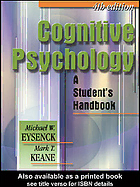
Cognitive psychology : a student's handbook PDF
Preview Cognitive psychology : a student's handbook
COGNITIVE PSYCHOLOGY To Christine with love (M.W.E.) To Ruth with love all ways (M.K.) The only means of strengthening one’s intellect is to make up one’s mind about nothing—to let the mind be a thoroughfare for all thoughts. Not a select party. (John Keats) Cognitive Psychology A Student’s Handbook Fourth Edition Michael W. Eysenck (Royal Holloway, University of London, UK) Mark Keane (University College Dublin, Ireland) HOVE AND NEW YORK First published 2000 by Psychology Press Ltd 27 Church Road, Hove, East Sussex BN3 2FA www.psypress.co.uk Simultaneously published in the USA and Canada by Taylor & Francis Inc. 325 Chestnut Street, Philadelphia, PA 19106 Psychology Press is an imprint of the Taylor & Francis Group This edition published in the Taylor & Francis e-Library, 2005. “To purchase your own copy of this or any of Taylor & Francis or Routledge’s collection of thousands of eBooks please go to www.eBookstore.tandf.co.uk.” Reprinted 2000, 2001 Reprinted 2002 (twice) and 2003 by Psychology Press 27 Church Road, Hove, East Sussex BN3 2FA 29 West 35th Street, New York, NY 10001 © 2000 by Psychology Press Ltd All rights reserved. No part of this book may be reprinted or reproduced or utilised in any form or by any electronic, mechanical, or other means, now known or hereafter invented, including photocopying and recording, or in any information storage or retrieval system, without permission in writing from the publishers. British Library Cataloguing in Publication Data A catalogue record for this book is available from the British Library ISBN 0-203-62630-3 Master e-book ISBN ISBN 0-203-62636-2 (Adobe eReader Format) ISBN 0-86377-550-0 (hbk) ISBN 0-86377-551-9 (pbk) Cover design by Hybert Design, Waltham St Lawrence, Berkshire Contents Preface xii 1. Introduction 1 Cognitive psychology as a science 1 Cognitive science 5 Cognitive neuropsychology 13 Cognitive neuroscience 18 Outline of this book 25 Chapter summary 26 Further reading 27 2. Visual perception: Basic processes 28 Introduction 28 Perceptual organisation 28 Depth and size perception 34 Colour perception 43 Brain systems 48 Chapter summary 56 Further reading 57 3. Perception, movement, and action 58 Introduction 58 Constructivist theories 59 Direct perception 64 Theoretical integration 68 Motion, perception, and action 70 Visually guided action 71 vi Perception of object motion 79 Chapter summary 87 Further reading 89 4. Object recognition 90 Introduction 90 Pattern recognition 91 Marr’s computational theory 96 Cognitive neuropsychology approach 106 Cognitive science approach 109 Face recognition 116 Chapter summary 128 Further reading 129 5. Attention and performance limitations 130 Introduction 130 Focused auditory attention 132 Focused visual attention 136 Divided attention 147 Automatic processing 155 Action slips 160 Chapter summary 165 Further reading 166 6. Memory: Structure and processes 167 Introduction 167 The structure of memory 167 Working memory 172 Memory processes 182 Theories of forgetting 187 Theories of recall and recognition 194 Chapter summary 203 Further reading 204 vii 7. Theories of long-term memory 205 Introduction 205 Episodic and semantic memory 205 Implicit memory 208 Implicit learning 211 Transfer appropriate processing 213 Amnesia 216 Theories of amnesia 223 Chapter summary 234 Further reading 235 8. Everyday memory 236 Introduction 236 Autobiographical memory 238 Memorable memories 245 Eyewitness testimony 249 Superior memory ability 256 Prospective memory 261 Evaluation of everyday memory research 263 Chapter summary 264 Further reading 265 9. Knowledge: Propositions and images 266 Introduction 266 What is a representation? 267 What is a proposition? 270 Propositions: Objects and relations 271 Schemata, frames, and scripts 276 What is an image? Some evidence 282 Propositions versus images 287 Kosslyn’s computational model of imagery 293 The neuropsychology of visual imagery 298 viii Connectionist representations 299 Chapter summary 304 Further reading 305 10. Objects, concepts, and categories 306 Introduction 306 Evidence on categories and categorisation 307 The defining-attribute view 313 The prototype view 317 The exemplar-based view 320 Explanation-based views of concepts 322 Conceptual combination 325 Concepts and similarity 326 Evaluating theories of categorisation 331 Neurological evidence on concepts 332 Chapter summary 333 Further reading 334 11. Speech perception and reading 335 Introduction 335 Listening to speech 336 Theories of word recognition 340 Cognitive neuropsychology 345 Basic reading processes 348 Word identification 352 Routes from print to sound 357 Chapter summary 365 Further reading 367 12. Language comprehension 368 Introduction 368 Sentence processing 368 Capacity theory 376 ix Discourse processing 379 Story processing 386 Chapter summary 397 Further reading 398 13. Language production 399 Introduction 399 Speech as communication 399 Speech production processes 401 Theories of speech production 403 Cognitive neuropsychology: Speech production 410 Cognitive neuroscience: Speech production 412 Writing: Basic processes 414 Cognitive neuropsychology: Writing 419 Speaking and writing compared 425 Language and thought 426 Chapter summary 428 Further reading 430 14. Problem solving: Puzzles, insight, and expertise 431 Introduction 431 Early research: The Gestalt school 433 Newell and Simon’s problem-space theory 438 Evaluating research on puzzles 446 Re-interpreting the Gestalt f indings 449 From puzzles to expertise 452 Evaluation of expertise research 461 Learning to be an expert 461 Cognitive neuropsychology of thinking 465 Chapter summary 466 Further reading 467 15. Creativity and discovery 468
